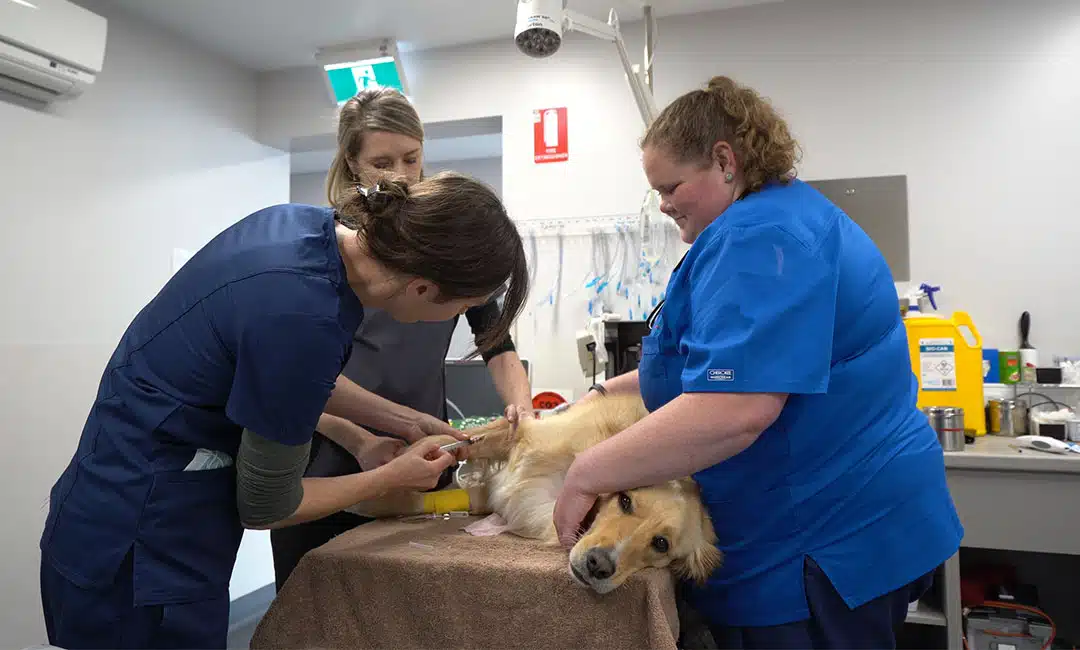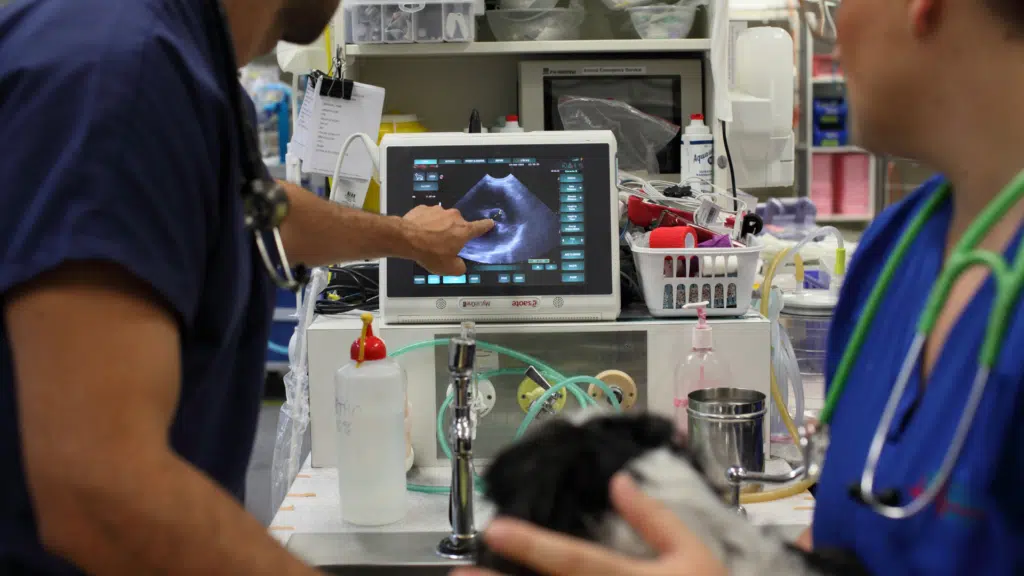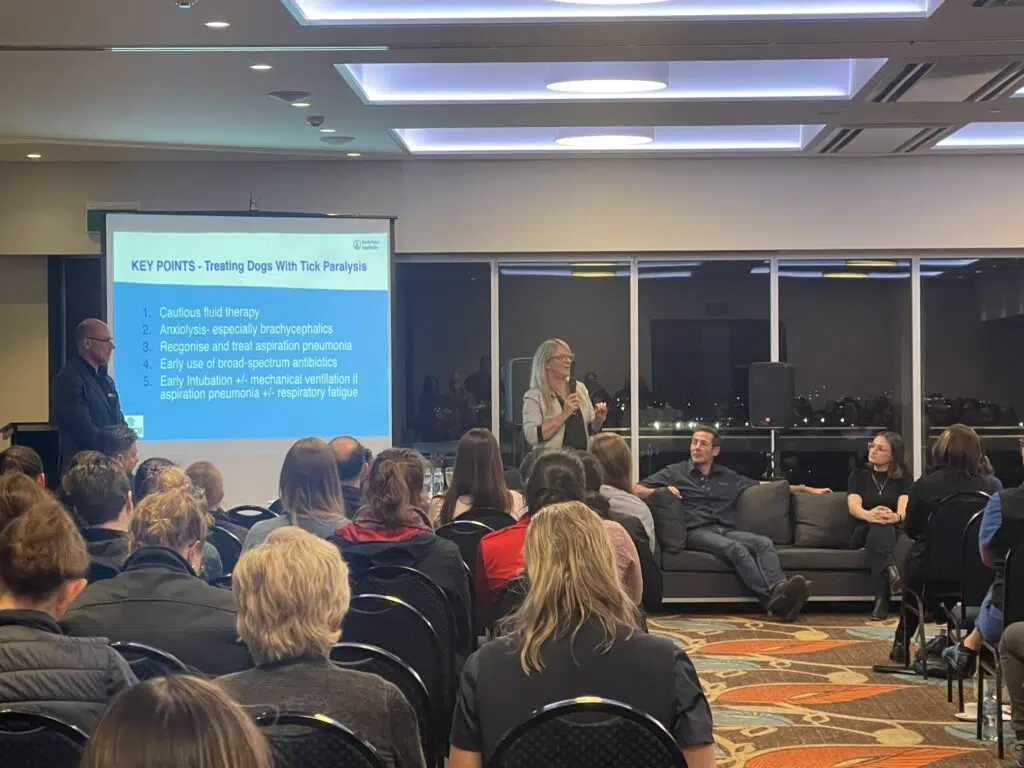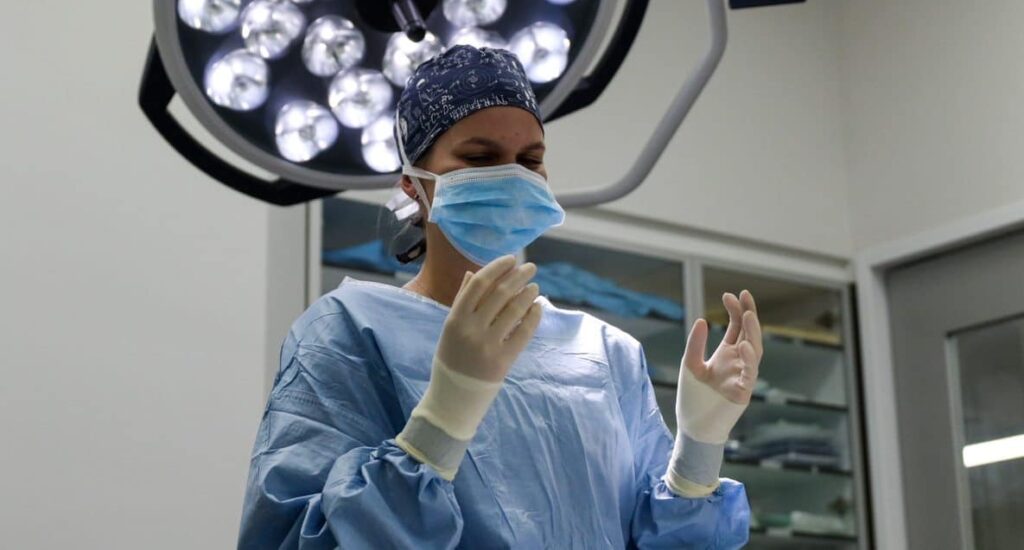Now that you know exactly what to expect from a graduate program, how to set yourself up to succeed, and the benefits a grad program can offer your professional advancement, it’s time to explore how we can help you grow as a veterinary professional.
We know that the word emergency gives a massive spike of adrenaline, but then almost just as quickly brings feelings of doubt and raises concerns as to whether or not you can do it. Many vets want to give emergency a go because it is action packed, interesting, and you learn so much plus you have a massive impact every shift. However, the uncertainty that comes with it can be daunting.
To overcome this challenge, the doubts and concerns, and to prepare you the best possible, the only way for us to do this is create a comprehensive program offering an immersive experience into the world of veterinary emergency and critical care: the AEA ECC Veterinary Graduate Program.
What does the program involve?
The core of the AEA ECC Graduate Program Program covers three main areas:
- Clinical and technical skills – mix of theory and practical training, both in the hospital and outside of the hospital.
- Professional development – the mindset, the tools and strategies you need to perform at your best
- Personal development – help you develop the right habits and practices to support your clinical skills and knowledge and professional development.
Animal Emergency Australia takes on the responsibility of training and teaching and developing our veterinary team members into becoming competent and confident emergency and critical care veterinarians. Our training package includes clinical and technical skill, knowledge and professional development, and personal tools and strategies that enable veterinarians to perform at a high level and thrive within the emergency and critical care environment. The training package encompasses the courses outlined below in addition to on-shift training and mentoring from experienced veterinarians, supervisors, and veterinarian team managers.
The Benefits
- Mentoring program – one mentor for graduate program period.
- Structured weekly and fortnightly check-ins to make sure that you are reviewing and reflecting on your progress both on shift and outside of work.
- Support to make sure you are transitioning ok, answer any questions you have regarding the training resources, and to troubleshoot and help you develop solutions to challenges that arise.
- Access to everything an emergency veterinarian would need:
- In-house diagnostic lab, digital radiology, ultrasound, advanced patient monitoring, critical care capabilities.
- 24/7 on-phone support and access to specialists in emergency and critical care and experienced intensive care nurses.
- Surrounded by a team of experienced and highly capable emergency veterinarians, nurses and client care representatives.
- The following courses, designed to cover the three fundamental areas that help make successful emergency vets:
Clinical Skills
Accelerated Emergency Program
The Accelerated Emergency Program, facilitated by our own Veterinary Education & Training business, has been designed specifically to help veterinarians transition into the emergency. Each of the 15 modules covers veterinary emergency topics relevant and applicable to the everyday clinical setting – your ‘need to knows’ for emergency practice!
Accelerated Emergency Program Modules
- Module 1: Blood Gas and Acid-base Analysis
- Module 2: Shock and Intravenous Fluids
- Module 3: Electrolytes
- Module 4: Clinical Pathology and Focused Ultrasound
- Module 5: Anaesthesia and Analgesia
- Module 6: Triage and CPR
- Module 7: Haematological and Coagulopathy Emergencies
- Module 8: Cardiovascular Emergencies
- Module 9: Respiratory Emergencies
- Module 10: Urogenital Emergencies
- Module 11: Ophthalmological Emergencies
- Module 12: Neurological Emergencies
- Module 13: Abdominal Emergencies
- Module 14: Endocrine Emergencies
- Module 15: Intoxications
The modules include diagnostic tools – how to best use, interpretation of diagnostic findings, recommendations for workup and management options, case-based assessments and overall critical care patient monitoring and care. Upon completion you gain postgraduate qualifications (Foundation Certificate in Emergency and Critical Care (FCert ECC)).
Accelerated Emergency Surgery Program
This program focuses on the common emergency surgical conditions. It covers the relevant background information, diagnostic findings, medical stabilisation and post-operative considerations, surgical principles and theory, followed by a step-by-step breakdown with accompanying videos from real surgeries so that you can see how it is performed in real life. Topics include:
- When to Cut?
- Abdominal and Intestinal Surgical Principles
- Splenectomy and Gastric Dilitation Volvulus
- Caesarean Section and Pyometra
- Tracheostomy, Septic Peritonitis and more!
The Accelerated Emergency Surgery Program will help you feel more prepared when having to perform an emergency surgery and is a valuable resource that you can go back to and watch to refresh your memory before scrubbing in.
Ultrasound & CPR Training
Ultrasound is one of the most powerful diagnostic tools available to emergency veterinarians. The training focuses on how to gain and optimise your image, how to perform focused abdominal and thoracic scans and then also how to perform a systematic ultrasound. This is a combination of theory and in-hospital practice.
Unlike in general practice where performing CPR is a one a year situation, in a busy emergency hospital, you can perform it several times a shift. This program which is based on the RECOVER guidelines gives you the skills and knowledge to know what to do and when to do it, so that the chances of success are increased ten fold.
Professional Development and Communication Skills
Vet Success Academy – Consult Room Mastery
Emergency consultations are challenging. Clients are in a new environment, in the middle of the night, their pet is sick, they have not met you before, and they are faced with having to decide in a short amount of time whether to allow you to treat their pet or not. The consultation room is where everything is decided. Just because you may know what needs to be done for their pet does not mean that will allow you to do it.
Vet Success Academy Consult Room Mastery Modules
- The importance of body language and non-verbal communication
- How to develop your verbal, vocal, and visual communication skills
- Understand what clients are really looking for
- The difference between price and value
- How to present a comprehensive treatment plan
- How to have the money conversation with ease and confidence
- How to deliver the estimate clearly and concisely
- How to navigate through a tough consultation
- How to manage conflict and confrontation in the consult room
For those who have mastered the consult room, it is a rewarding and fulfilling experience where you get to connect with clients and save lives. This program will give you the strategies and skills you need to be able to feel confident, knowledgeable and professional every single time no matter the case, client or cost.
THRIVE – The Fundamentals
Working in emergency is challenging, it is a high pressure, fast paced environment with complex cases often during the night or weekends. Thrive – The Fundamentals is a program that covers the key areas to help set you up for success. You need to have the fundamentals sorted to be able to perform at your best at the crash bench. Topics include:
- Nutrition
- Thriving Through Stress
- Avoiding Burnout
- Sleep
- Bringing the Energy
- Tackling Imposter Syndrome and more!
Personal Development
AEA LIVE Program – Leadership, Inspire, Vision, Excellence
This personal development program has been specifically developed with emergency veterinary professionals in mind. It is an AEA initiative that is designed to help emergency veterinary professionals develop in the main areas that are often forgotten or not considered as important as clinical or technical knowledge and skills.
We have learned the hard way that technical and clinical prowess does not automatically equate to being great at working in an emergency environment. So we created this program to share the new skills, tools and strategies, develop the mindset and habits that will help our emergency team be successful in the long term.
AEA LIVE Program Modules
- Turning pro and turning up ready – Identifying and bringing the best version of you
- Imposter syndrome – What subtype are you and strategies you can use
- Values – What are they and why are they important
- Coaching and mentoring – What are the differences and how to be prepared
- Feedback – What is the value and how to make the most out of it
- Effective change management
- Self-management related topics focusing on building resilience, improving wellbeing and mental health and more…
The goal of the LIVE Program is to help veterinary professionals at all levels to do and be their best in the challenging veterinary environment.
The AEA ECC Veterinary Graduate Program provides an opportunity for vets of any experience to establish a career in emergency critical care medicine & surgery with the support and guidance of experienced clinicians. From recent graduates to experienced veterinarians, our goal at AEA is to help vets to do and be their best.
Does this sound like the perfect career advancement for you? Join our waitlist below and we’ll keep in touch with any future opportunities.
Join the Waitlist for our ECC Graduate Program
PLEASE NOTE: 2024 is closed. 2025 is only looking for potential intake in June only. Full prior to June in 2025.




